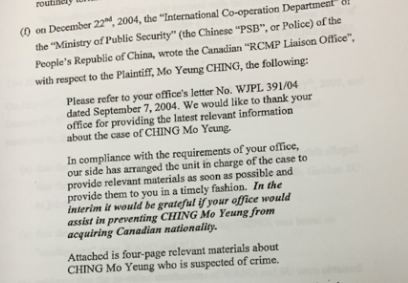
Exclusive | Chinese fugitive Ching Mo Yeung is a criminal and fraudster, says Canada’s immigration ministry
Scathing statement follows revelation Chinese police asked Canada to deny citizenship to Vancouver property mogul, now seeking asylum
UPDATE: Michael Ching Mo Yeung has commenced legal proceedings against South China Morning Post in the Supreme Court of British Columbia. Mr Ching alleges in his lawsuit that this article contains false and defamatory statements, and that the conduct of South China Morning Post and its reporter was malicious, reprehensible, high-handed, and blameworthy.
Canada’s immigration ministry has launched a scathing attack on Chinese corruption fugitive Michael Ching Mo Yeung, describing the Vancouver property mogul as a criminal and a fraudster.
The extraordinary statement was issued to the South China Morning Post on Thursday, two days after the Post exposed Ching as graft suspect Cheng Muyang, son of disgraced Hebei politician Cheng Weigao, who died in 2010.
But Ching has not been convicted of any crimes and is not believed to be the subject of a Canadian criminal investigation. The Post has no evidence of his guilt or innocence.
Asked to comment on Ching’s case, and his claims to have been unfairly denied Canadian citizenship, Citizenship and Immigration Canada issued a written statement: “Canadians are generous and welcoming people, but they have no tolerance for criminals and fraudsters abusing our generosity.
“Once individuals have exhausted all legal avenues, we expect them to respect our immigration laws and leave Canada, or to be removed.”

The ministry’s statement came as it emerged that Canadian police were asked by Chinese counterparts in 2004 to prevent Ching from acquiring Canadian citizenship, according to a letter cited in a lawsuit by Ching.
The 2012 lawsuit suggests Canadian and Chinese authorities have been discussing his presence in Canada and his true identity since at least 2001.
Ching - wanted for graft and illegal asset transfers - is now seeking refugee status in Canada, having been denied citizenship after more than a decade of trying.
In China’s first official comments on Ching’s identification, Foreign Ministry spokesman Hong Lei said on Thursday that “staying abroad does not mean being able to stay outside the law”.
He added: “The Chinese government is determined to crack down on corruption. No matter where the corrupt flee, the Chinese side will bring them to justice. Absconders like Cheng Muyang are bound to receive due punishment.”

A copy of the lawsuit, provided by reporter Bob Mackin of the Vancouver Courier, shows Ching is seeking damages of C$1.75 million (HK$11 million) from Immigration and Refugee Board member Kashi Mattu, along with the immigration minister and attorney general. The case is ongoing.
Ching’s statement of claim says that from 2001 to 2004, Chinese police discussed him with Canada’s federal police liaison office in Beijing. The statement quotes a December 22, 2004, letter from the international co-operation department of China’s Ministry of Public Security, to the Royal Canadian Mounted Police (RCMP) Liaison Office.
“We would like to thank your office for providing the latest relevant information about the case of CHING Mo Yeung,” the letter is quoted as saying.
“In compliance with the requirements of your office, our side has arranged the unit in charge of the case to provide relevant materials as soon as possible and provide them to you in a timely fashion. In the interim it would be grateful if your office would assist in preventing CHING Mo Yeung from acquiring Canadian nationality.”
READ MORE: Beijing vows to push ahead with pursuit of graft fugitive Cheng Muyang in Canada
Ching’s lawsuit says China is accusing him of embezzlement, but the charges are “completely unfounded”, and evidence was obtained by the torture of two alleged business associates, Wang Fuyou and Su Guoben. Evidence against him, Ching said, was based on Wang and Su’s “confessions”.
The Canadian officials Ching is suing were conspiring to deny him citizenship and “to pave the way for his removal to torture and unlawful imprisonment in a dictatorial state”, the lawsuit states.
Asked to respond, a spokewoman for the RCMP told the Post on Thursday that the force “does not discuss the nature of communications between foreign law enforcement agencies and the RCMP”. Ching and his lawyer have refused requests for comment on his case.
The lawsuit reveals that Ching became a permanent resident of Canada in 1996, not 2000 as has been widely reported, and that he and wife Heung Kie Sung have three children – one born in mainland China, one in Hong Kong and one in Canada. Ching first applied for Canadian citizenship in 2001, failed, then tried again in 2005.
The South China Morning Post reported yesterday that Ching is now seeking refugee status in Canada, and has hired renowned human rights lawyer David Matas, who also represented smuggler Lai Changxing. Lai failed in his bid for Canadian refugee status and in 2011 was deported to China, where he is serving a life sentence.
UPDATE: On August 23, 2016, Interpol concluded that data registered in its files concerning Michael Ching Mo Yeung was not compliant with Interpol’s rules and, accordingly, the data including the Interpol “red notice” previously issued was deleted.

